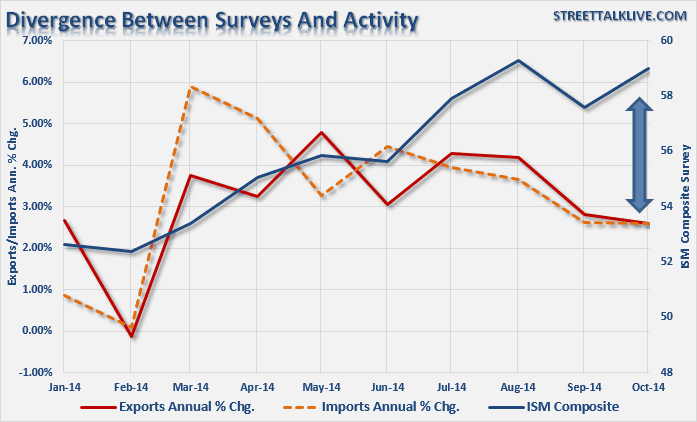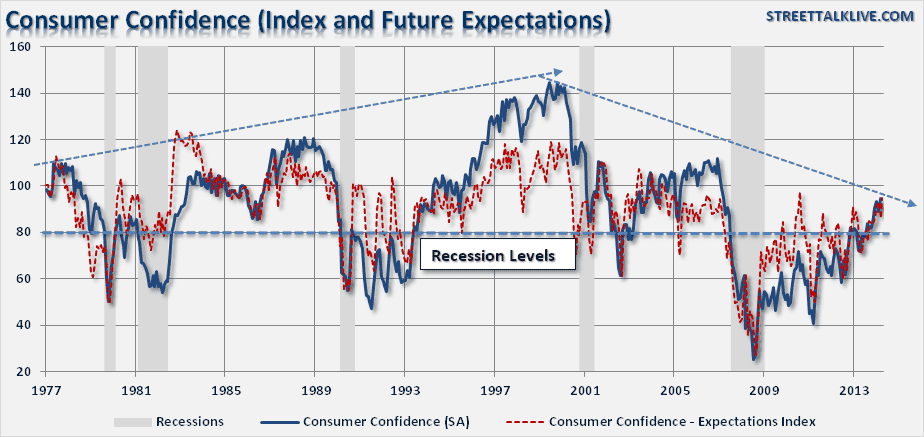Recently, voters across the nation sent a very clear message to Washington D.C. by putting conservative Republican's firmly in charge of both houses of Congress. That message was "the economy sucks."
The dichotomy between the statistical economic data released by various governmental and private agencies continues to be quite wide. For example, the BLS reports the unemployment rate to be just 5.9% suggesting the economy is running near "full-employment." But that point obscures the fact that roughly 45% of individuals between the working age of 16-54 are no longer counted as part of the work force.
Another example is the recent surge in the sentiment based (i.e. emotion) manufacturing surveys that have surged to multi-year highs while the actual manufacturing data has declined. To wit:
"The ISM: October PMI registered 59 percent, an increase of 2.4 percentage points from September's reading of 56.6 percent, indicating continued expansion in manufacturing. The New Orders Index registered 65.8 percent, an increase of 5.8 percentage points from the 60 percent reading in September."
However, Markit recently reported that U.S. factory activity growth was at three-month low in October. To wit:
The U.S. manufacturing sector slowed in October to its lowest rate of growth since July, while a gauge of new orders hit its lowest level since January, an industry report showed on Monday.
Markit said its final U.S. Manufacturing Purchasing Managers Index fell to 55.9 from September's final reading of 57.5. The reading showed an even sharper slowdown than initially estimated in Markit's preliminary or "flash" PMI reading of 56.2 on Oct 23 and was the index's largest decline since February."
The chart below shows the ISM Composite Index, (a simple average of both manufacturing and non-manufacturing surveys), as compared to the import/export activity domestically. (The level of change in exports and imports denote real demand for products, goods and services in the economy. Falling imports suggest weak consumer trends domestically which will likely impact domestic sales in the near future.)
Of course, the decline in consumption should come as no surprise considering that for a vast majority of Americans their financial "lot in life" has not improved since the financial crisis. As I discussed recently:
"The "economic recovery" story is also extremely fragmented when looking at median incomes. According to the Fed survey, median household before-tax incomes have fallen from near ,000 annually to roughly ,000 currently."
"Again, the story deepens when viewed by age groups."
"Interestingly, the ONLY age-group where incomes have improved is for those between the ages of 65-74. Again, this suggests that the plunge in the LFPR is not a function of 'retirement' but rather individuals working well into their retirement years, not because of a desire to work, but due to necessity."
Lastly, reported consumer confidence surveys have been surging higher in recent months as shown in the latest report from the Census Bureau.
There are a couple of noteworthy points to be made. First, consumer confidence has been declining since the turn of the century as compared to the steadily rising trend of confidence that began in the late 70's. The primary driver of that increase in confidence was access to easy and cheap credit terms. Conversely, the current environment is one of overleveraged consumers with little ability to take on additional credit. Secondly, while it is notable that consumer confidence has reached the highest level since prior to the financial crisis, it is just barely above levels where we begin worrying about the onset of a recession.
The last point is important, because despite rising "reported" consumer confidence, the bulk of American's have a much dimmer view about the current economic environment.
What is interesting is that hard data all suggests a sluggish economic environment while "sentiment" based data expresses continued "hope" about an improving future. History suggests that sentiment tends to give way to the actual data rather than vice-versa. Of course, this has been the ongoing story of the economy over the last five years as continued predictions of surging economic growth have been dashed against the rocks of reality.
With the Eurozone, Japan, Russian and China all either slowing or in a recessionary state, the deflationary drag on the U.S. economy will become a rather formidable headwind. With the economy already growing rather weakly there is little ability to absorb much of the global drag or an exogenous shock such as another extremely cold winter.
[Related: China, Europe, and Optimal Currency Zones]
American voters have come to realize that "hope and change" is not coming. While statistical economic data suggests that the economy is rapidly healing, it has only been so for a very small percentage of the players. For most American's they have only watched the "rich" prosper as the Federal Reserve put Wall Street before Main Street. Despite the many promises from the current Administration that help was on the way, it never arrived.
Their vote last night was a clear and simple message - "the economy sucks, fix it."












